How to uninstall SecurePass potentially unwanted application
Potentially unwanted applicationAlso Known As: SecurePass potentially unwanted application
Get free scan and check if your device is infected.
Remove it nowTo use full-featured product, you have to purchase a license for Combo Cleaner. Seven days free trial available. Combo Cleaner is owned and operated by RCS LT, the parent company of PCRisk.com.
What kind of application is SecurePass?
While browsing dubious websites, our research team found the SecurePass PUA (Potentially Unwanted Application). It is presented as a tool capable of creating secure passwords and checking their strength. Unwanted apps are distributed using questionable or downright deceptive methods, and they often possess harmful functionalities.

Potentially unwanted application overview
Potentially unwanted applications typically have undesirable and even dangerous capabilities. In many cases, these apps possess data-tracking functionalities and utilize them to gather browsing histories, browser cookies, log-in credentials, personally identifiable information, credit/debit card numbers, etc. This sensitive data can be monetized via sale to third-parties.
PUAs may also operate as adware or browser hijackers. Adware is designed to generate revenue through advertising, which is achieved via ads or redirects.
Browser hijackers assign promoted sites as browsers' default search engines, homepages, and new tab/window URLs. Hence, users are forced to visit the endorsed fake search engine whenever they enter a search query into the URL bar or open a new browser tab/window. Websites of this kind cannot generate search results and lead users to legitimate Internet search sites (e.g., Google, Yahoo, Bing, etc.).
It must be mentioned that PUAs can have other harmful abilities, and they often infiltrate devices alongside other unwanted/malicious programs.
To summarize, unwanted software is associated with the following risks – system infections, severe privacy issues, financial losses, and identity theft.
| Name | SecurePass potentially unwanted application |
| Threat Type | PUP (Potentially Unwanted Program), PUA (Potentially Unwanted Application) |
| Supposed Functionality | Creating strong passwords and checking password security. |
| Detection Names (installer) | N/A (VirusTotal) |
| Detection Names (app) | N/A (VirusTotal) |
| Symptoms | A program that you do not recall installing suddenly appeared on your computer. Seeing advertisements not originating from the sites you are browsing. Intrusive pop-up ads. Rogue redirects. Decreased Internet browsing speed. |
| Distribution Methods | Deceptive pop-up ads, free software installers (bundling). |
| Damage | Monetary loss (unnecessary purchase of fake software), privacy issues, unwanted warning pop-ups, slow computer performance. |
| Malware Removal (Windows) |
To eliminate possible malware infections, scan your computer with legitimate antivirus software. Our security researchers recommend using Combo Cleaner. Download Combo CleanerTo use full-featured product, you have to purchase a license for Combo Cleaner. 7 days free trial available. Combo Cleaner is owned and operated by RCS LT, the parent company of PCRisk.com. |
Potentially unwanted application examples
Easy2Convert, PrivacyBrowse, and SafeDomain Guardian are merely a couple of our newest articles on PUAs. Usually, unwanted applications appear harmless and offer useful features. However, these functionalities rarely work as advertised, and in most cases – they do not work at all.
Remember that even if a piece of software operates exactly as indicated by its promotional material – that is not a guarantee of legitimacy or safety.
How did potentially unwanted applications install on my computer?
We downloaded SecurePass from a deceptive promotional page. Websites promoting PUAs can wear a variety of disguises and even use scare tactics to trick users into downloading the software. These webpages are primarily accessed via redirects caused by intrusive ads, sites employing rogue advertising networks, mistyped URLs, spam browser notifications, and adware.
The bundling marketing technique – packing regular program installation setups with unwanted/malicious supplements – is also used in PUA distribution.
The danger of inadvertently allowing bundled content into the device is increased by downloading from suspicious sources (e.g., freeware and free file-hosting websites, P2P sharing networks, etc.) and by inattentiveness when installing (e.g., ignoring terms, using "Easy/Quick" settings, etc.).
Additionally, intrusive advertisements proliferate unwanted software. When clicked on, some of these adverts can execute scripts to perform downloads/installations without user consent.
How to avoid installation of potentially unwanted applications?
We strongly recommend researching software and downloading it only from official/verified channels. Installation processes must be approached with care, e.g., by studying terms and options, using the "Custom/Advanced" settings, and opting out of all additional apps, extensions, tools, etc.
Another recommendation is to be vigilant when browsing since fake and malicious online content typically appears legitimate and innocuous. For example, despite their harmless appearance – intrusive advertisements redirect to unreliable and questionable sites (e.g., scam-promoting, gambling, adult dating, etc.).
In case of continuous encounters with such advertisements/redirects, inspect the system and immediately remove all dubious applications and browser extensions/plug-ins. If your computer is already infected with PUAs, we recommend running a scan with Combo Cleaner Antivirus for Windows to automatically eliminate them.
Installation folder of the SecurePass application:

Website promoting SecurePass application:

Instant automatic malware removal:
Manual threat removal might be a lengthy and complicated process that requires advanced IT skills. Combo Cleaner is a professional automatic malware removal tool that is recommended to get rid of malware. Download it by clicking the button below:
DOWNLOAD Combo CleanerBy downloading any software listed on this website you agree to our Privacy Policy and Terms of Use. To use full-featured product, you have to purchase a license for Combo Cleaner. 7 days free trial available. Combo Cleaner is owned and operated by RCS LT, the parent company of PCRisk.com.
Quick menu:
- What is SecurePass?
- STEP 1. Uninstall deceptive applications using Control Panel.
- STEP 2. Remove rogue extensions from Google Chrome.
- STEP 3. Remove potentially unwanted plug-ins from Mozilla Firefox.
- STEP 4. Remove rogue extensions from Safari.
- STEP 5. Remove rogue plug-ins from Microsoft Edge.
Removal of potentially unwanted applications:
Windows 11 users:
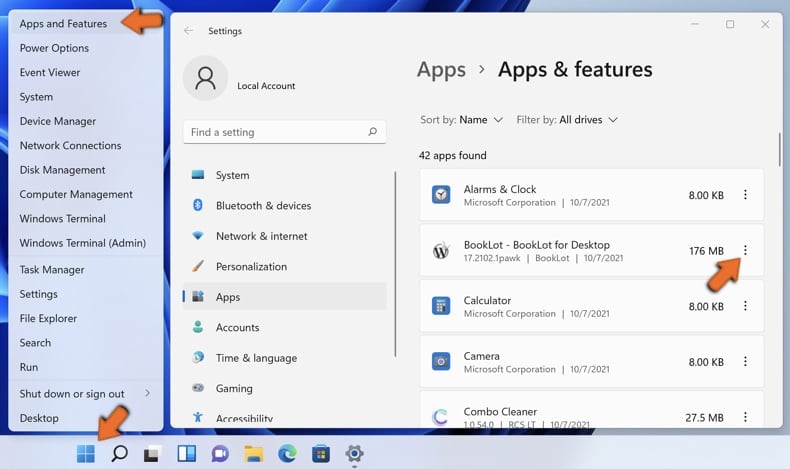
Right-click on the Start icon, select Apps and Features. In the opened window search for the application you want to uninstall, after locating it, click on the three vertical dots and select Uninstall.
Windows 10 users:
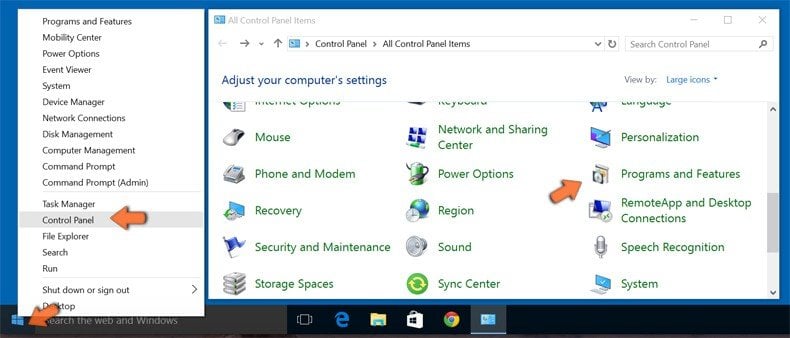
Right-click in the lower left corner of the screen, in the Quick Access Menu select Control Panel. In the opened window choose Programs and Features.
Windows 7 users:
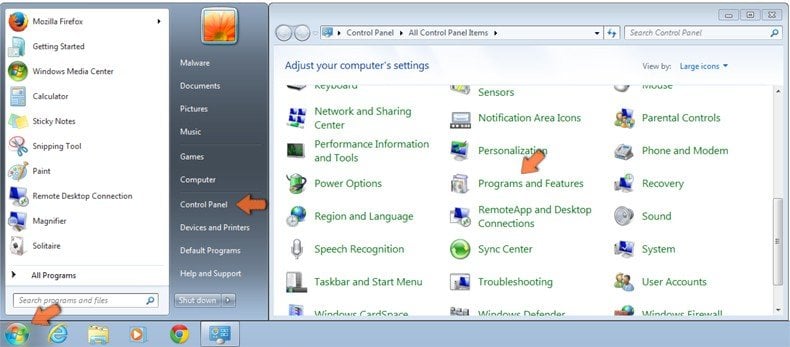
Click Start (Windows Logo at the bottom left corner of your desktop), choose Control Panel. Locate Programs and click Uninstall a program.
macOS (OSX) users:
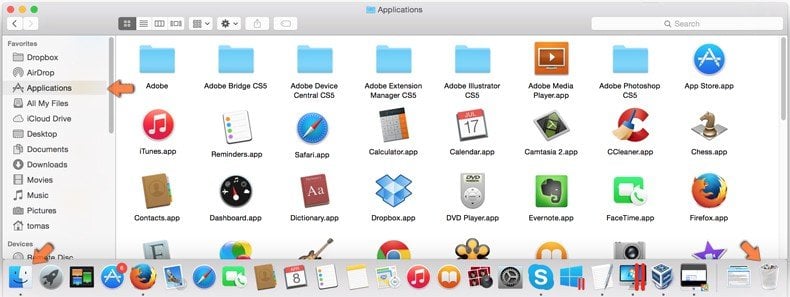
Click Finder, in the opened screen select Applications. Drag the app from the Applications folder to the Trash (located in your Dock), then right click the Trash icon and select Empty Trash.

In the uninstall programs window, look for "SecurePass" and other suspicious/recently-installed applications, select these entries and click "Uninstall" or "Remove".
After uninstalling the potentially unwanted application, scan your computer for any remaining unwanted components or possible malware infections. To scan your computer, use recommended malware removal software.
DOWNLOAD remover for malware infections
Combo Cleaner checks if your computer is infected with malware. To use full-featured product, you have to purchase a license for Combo Cleaner. 7 days free trial available. Combo Cleaner is owned and operated by RCS LT, the parent company of PCRisk.com.
Remove rogue extensions from Internet browsers:
At time of research, SecurePass did not install any unwanted browser extensions, however, some unwanted applications can be installed together with adware and browser hijackers. If you experience unwanted ads or redirects when browsing the Internet, continue with the removal guide below.
Video showing how to remove potentially unwanted browser add-ons:
 Remove malicious extensions from Google Chrome:
Remove malicious extensions from Google Chrome:

Click the Chrome menu icon ![]() (at the top right corner of Google Chrome), select "More Tools" and click "Extensions". Locate all recently-installed suspicious extensions, select these entries and click "Remove".
(at the top right corner of Google Chrome), select "More Tools" and click "Extensions". Locate all recently-installed suspicious extensions, select these entries and click "Remove".

Optional method:
If you continue to have problems with removal of the securepass potentially unwanted application, reset your Google Chrome browser settings. Click the Chrome menu icon ![]() (at the top right corner of Google Chrome) and select Settings. Scroll down to the bottom of the screen. Click the Advanced… link.
(at the top right corner of Google Chrome) and select Settings. Scroll down to the bottom of the screen. Click the Advanced… link.
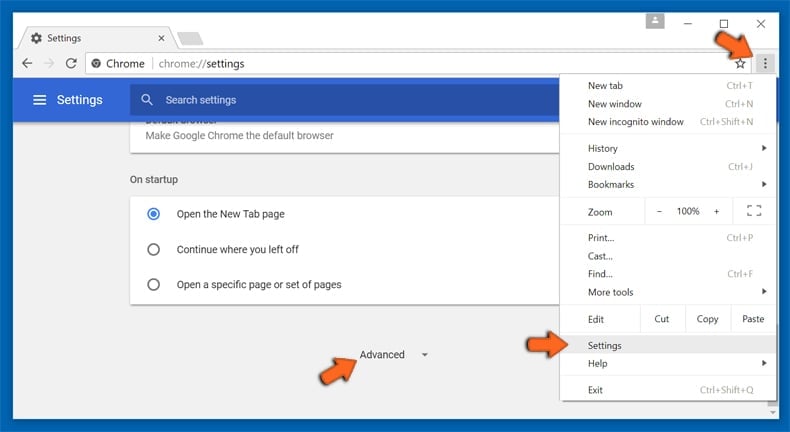
After scrolling to the bottom of the screen, click the Reset (Restore settings to their original defaults) button.
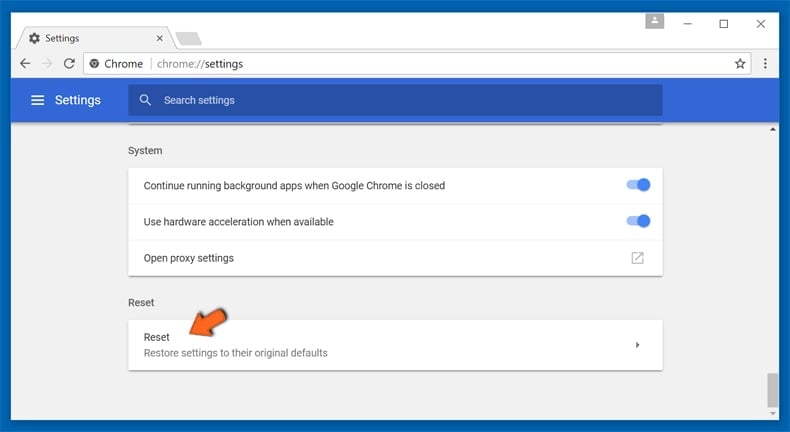
In the opened window, confirm that you wish to reset Google Chrome settings to default by clicking the Reset button.
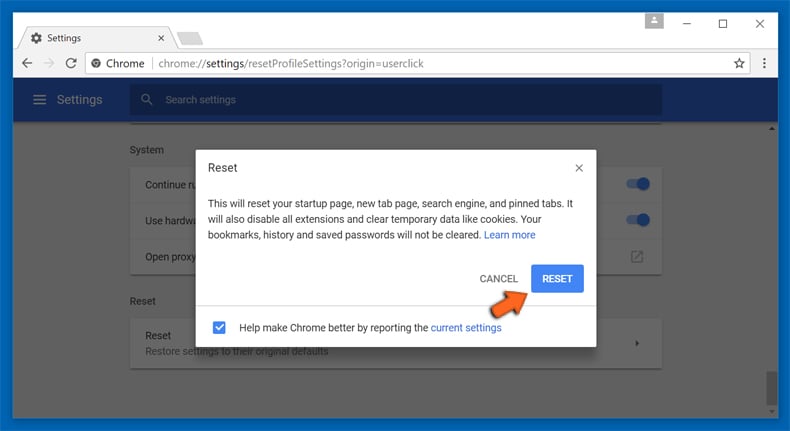
 Remove malicious plugins from Mozilla Firefox:
Remove malicious plugins from Mozilla Firefox:

Click the Firefox menu ![]() (at the top right corner of the main window), select "Add-ons and themes". Click "Extensions", in the opened window locate all recently-installed suspicious extensions, click on the three dots and then click "Remove".
(at the top right corner of the main window), select "Add-ons and themes". Click "Extensions", in the opened window locate all recently-installed suspicious extensions, click on the three dots and then click "Remove".

Optional method:
Computer users who have problems with securepass potentially unwanted application removal can reset their Mozilla Firefox settings.
Open Mozilla Firefox, at the top right corner of the main window, click the Firefox menu, ![]() in the opened menu, click Help.
in the opened menu, click Help.
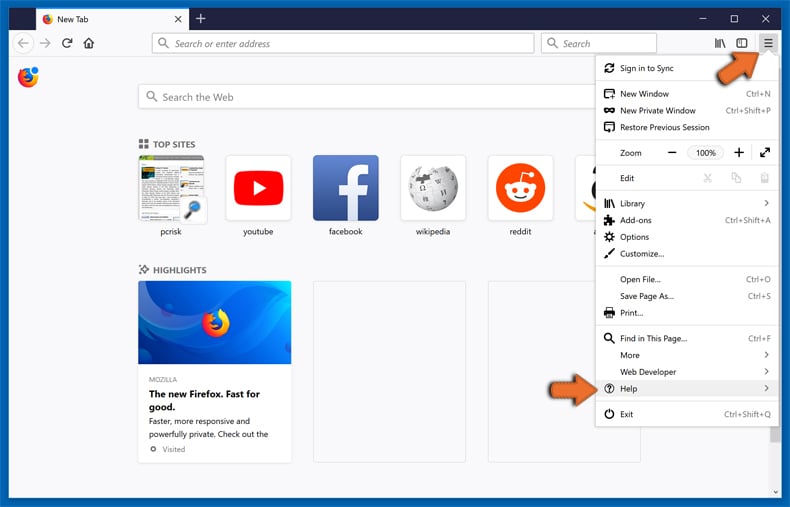
Select Troubleshooting Information.
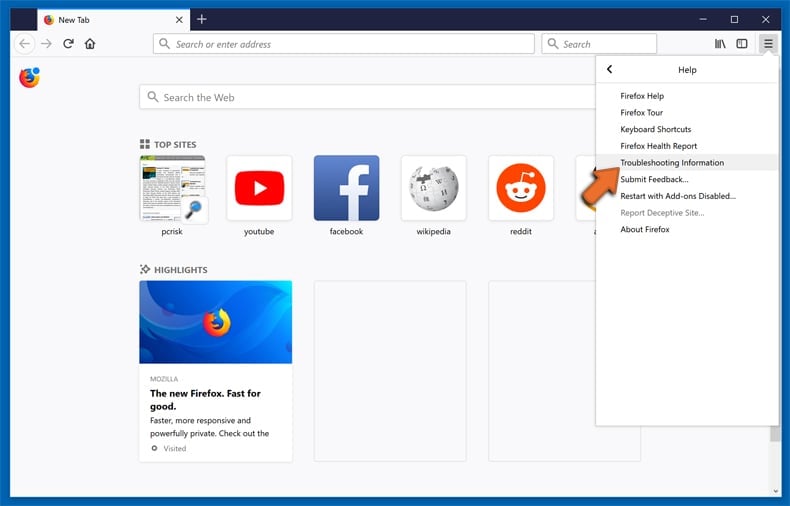
In the opened window, click the Refresh Firefox button.
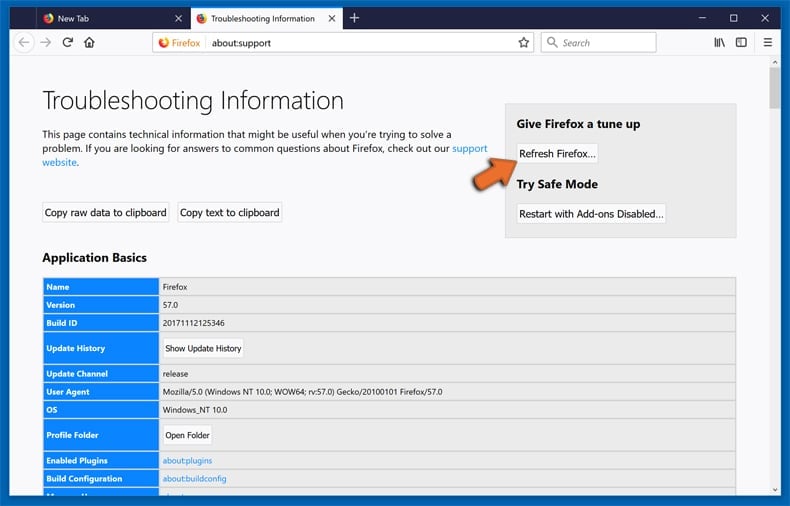
In the opened window, confirm that you wish to reset Mozilla Firefox settings to default by clicking the Refresh Firefox button.
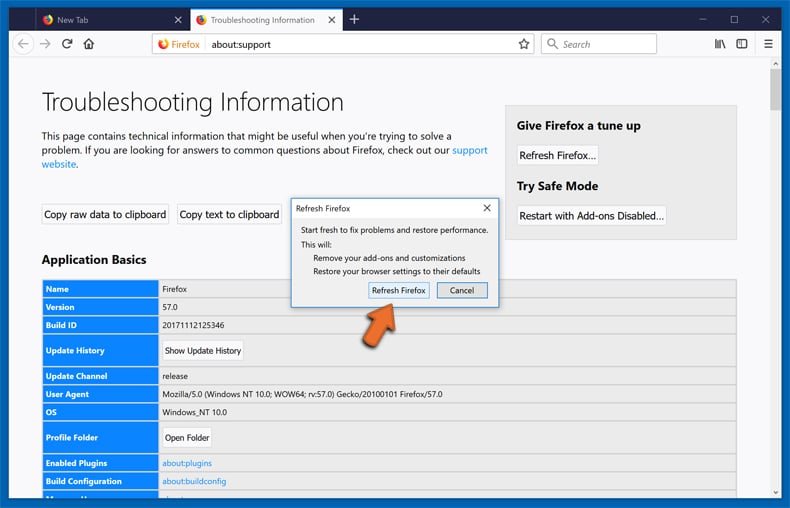
 Remove malicious extensions from Safari:
Remove malicious extensions from Safari:
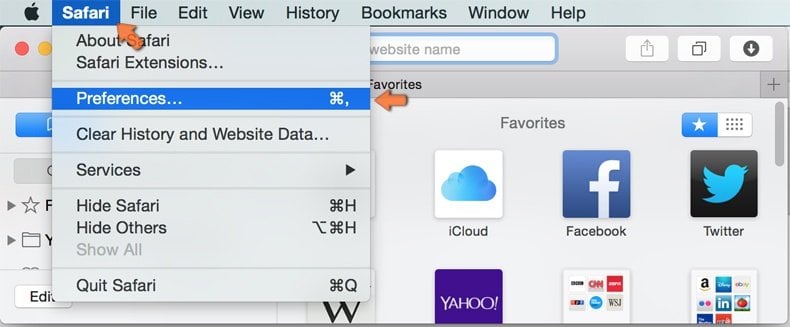
Make sure your Safari browser is active, click Safari menu, and select Preferences....
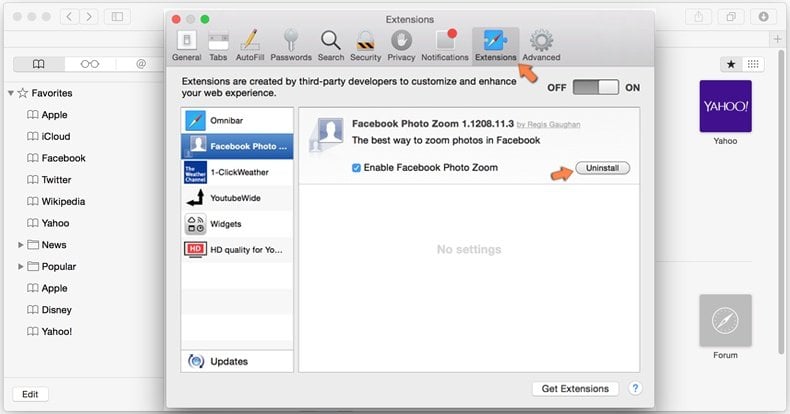
In the opened window click Extensions, locate any recently installed suspicious extension, select it and click Uninstall.
Optional method:
Make sure your Safari browser is active and click on Safari menu. From the drop down menu select Clear History and Website Data...
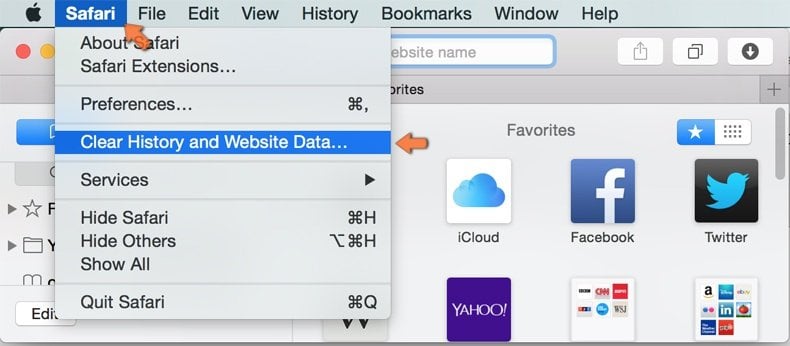
In the opened window select all history and click the Clear History button.
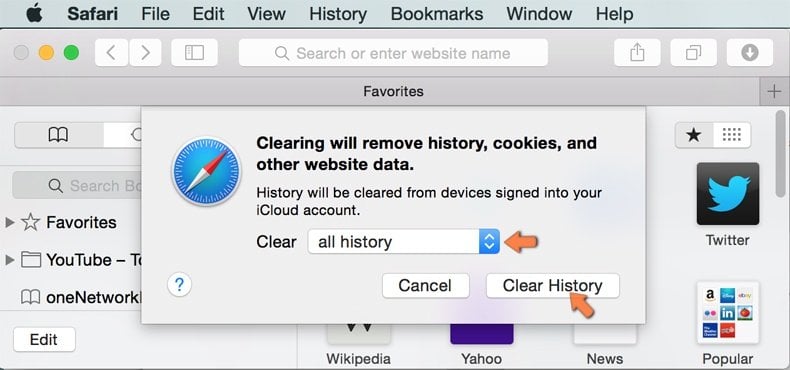
 Remove malicious extensions from Microsoft Edge:
Remove malicious extensions from Microsoft Edge:
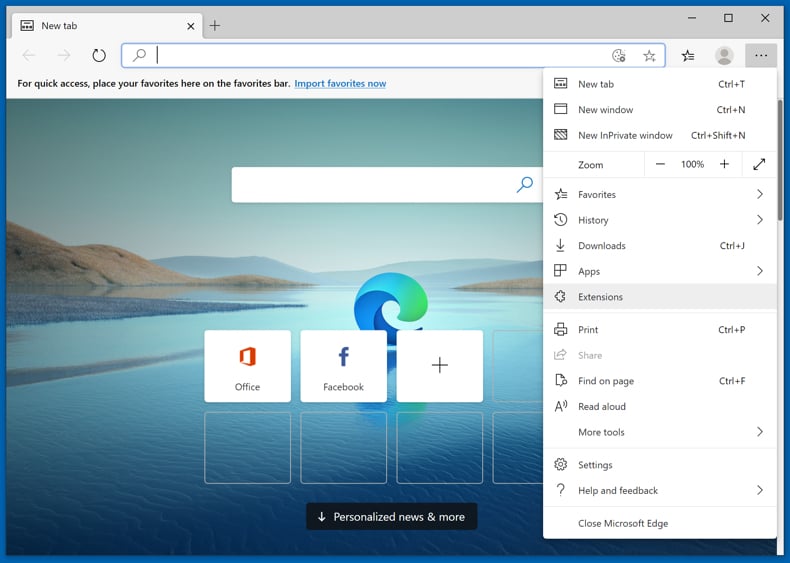
Click the Edge menu icon ![]() (at the upper-right corner of Microsoft Edge), select "Extensions". Locate all recently-installed suspicious browser add-ons and click "Remove" below their names.
(at the upper-right corner of Microsoft Edge), select "Extensions". Locate all recently-installed suspicious browser add-ons and click "Remove" below their names.
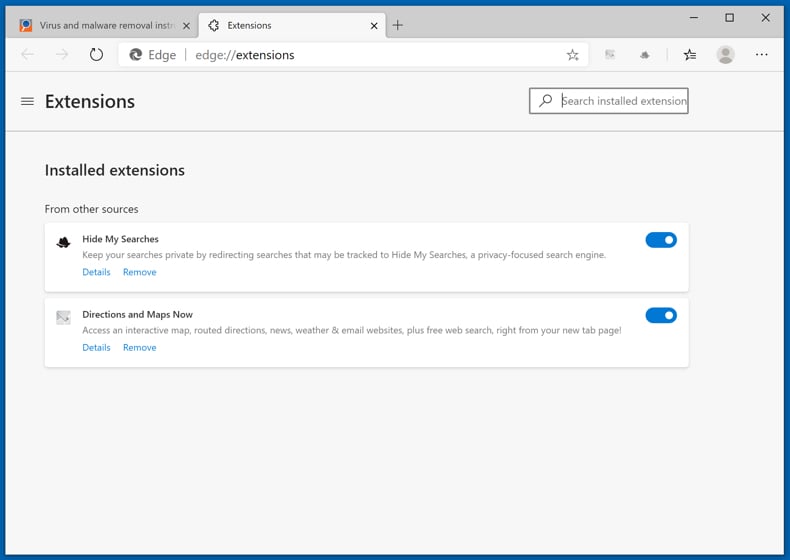
Optional method:
If you continue to have problems with removal of the securepass potentially unwanted application, reset your Microsoft Edge browser settings. Click the Edge menu icon ![]() (at the top right corner of Microsoft Edge) and select Settings.
(at the top right corner of Microsoft Edge) and select Settings.
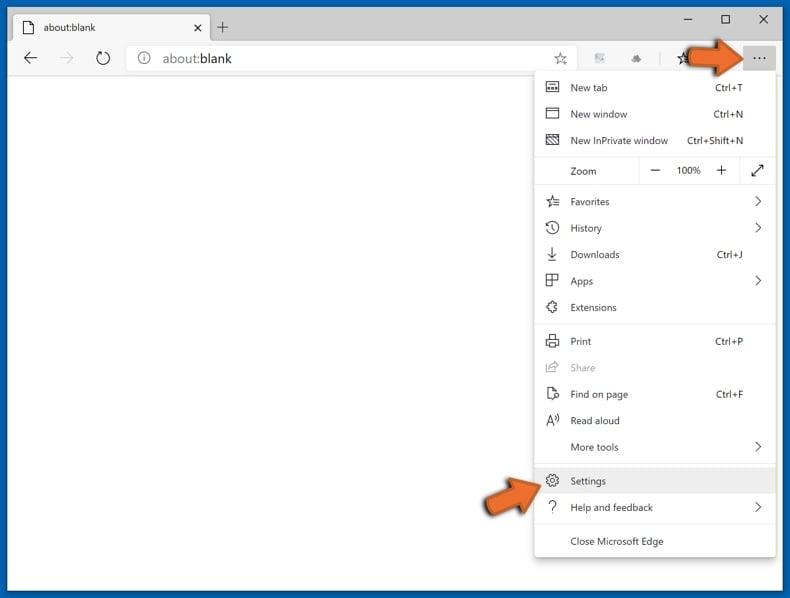
In the opened settings menu select Reset settings.
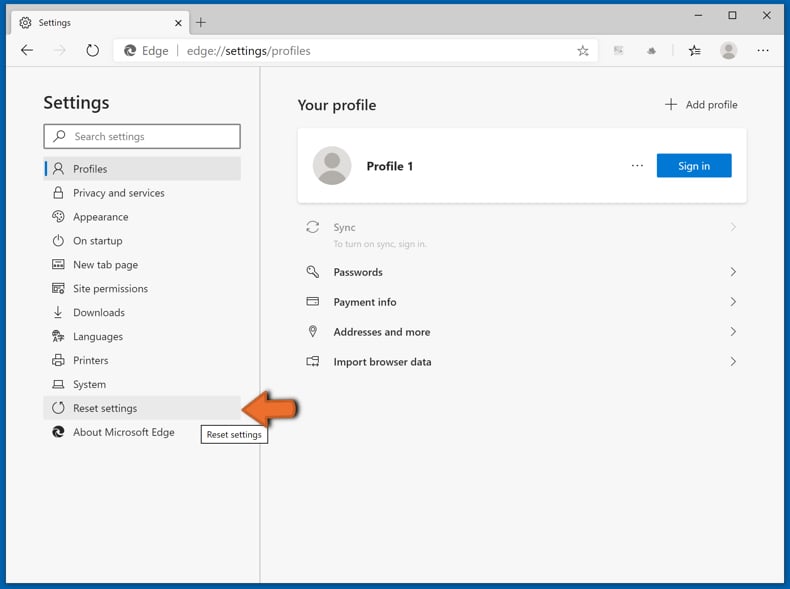
Select Restore settings to their default values. In the opened window, confirm that you wish to reset Microsoft Edge settings to default by clicking the Reset button.
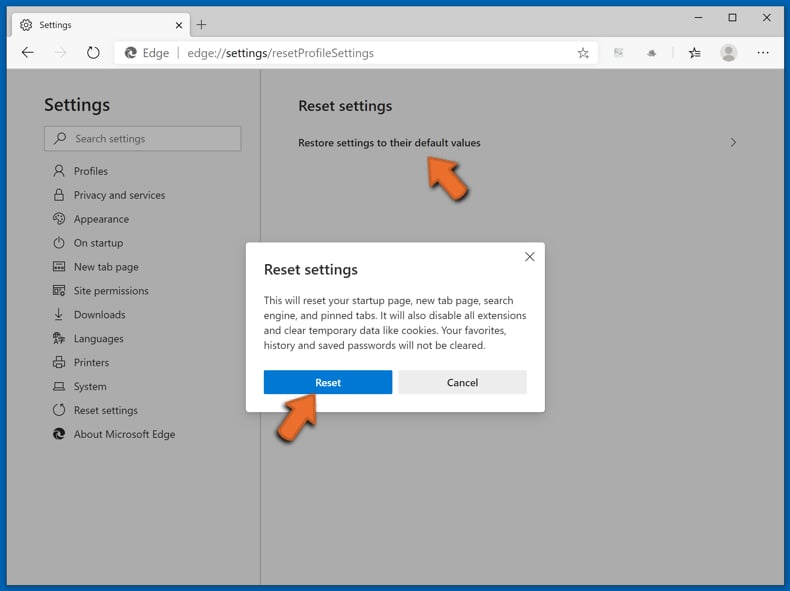
- If this did not help, follow these alternative instructions explaining how to reset the Microsoft Edge browser.
Summary:
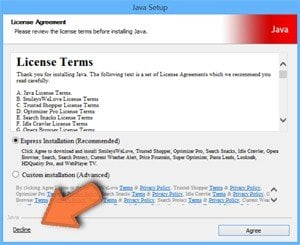 Commonly, adware or potentially unwanted applications infiltrate Internet browsers through free software downloads. Note that the safest source for downloading free software is via developers' websites only. To avoid installation of adware, be very attentive when downloading and installing free software. When installing previously-downloaded free programs, choose the custom or advanced installation options – this step will reveal any potentially unwanted applications listed for installation together with your chosen free program.
Commonly, adware or potentially unwanted applications infiltrate Internet browsers through free software downloads. Note that the safest source for downloading free software is via developers' websites only. To avoid installation of adware, be very attentive when downloading and installing free software. When installing previously-downloaded free programs, choose the custom or advanced installation options – this step will reveal any potentially unwanted applications listed for installation together with your chosen free program.
Post a comment:
If you have additional information on securepass potentially unwanted application or it's removal please share your knowledge in the comments section below.
Frequently Asked Questions (FAQ)
What is the purpose of an unwanted application?
Unwanted applications aim to generate revenue for their developers/publishers through nefarious means. To expand upon this, this software may collect/sell private data, deceive users into buying fake activation keys, endorse content (via ads, redirects, etc.), proliferate malware, and so on.
Is SecurePass unwanted application legal?
In most cases, unwanted applications are deemed to be legal because their EULAs (End User License Agreements) provide information concerning the software's behavior.
Is having SecurePass installed on my computer dangerous?
Since unwanted applications often possess harmful capabilities, having them installed on your device is considered a risk. Generally, this type of software is associated with system infections, severe privacy issues, financial losses, and identity theft.
Will Combo Cleaner help me remove SecurePass unwanted application?
Combo Cleaner will scan your computer and remove detected unwanted/malicious apps. It is noteworthy that manual removal (performed without security tools) might not be a perfect solution. After an unwanted application has been manually removed – various leftovers (files) can remain hidden within the system. What is more, these remnants may continue to run and cause issues. Therefore, it is paramount to eliminate undesirable software thoroughly.
Share:

Tomas Meskauskas
Expert security researcher, professional malware analyst
I am passionate about computer security and technology. I have an experience of over 10 years working in various companies related to computer technical issue solving and Internet security. I have been working as an author and editor for pcrisk.com since 2010. Follow me on Twitter and LinkedIn to stay informed about the latest online security threats.
PCrisk security portal is brought by a company RCS LT.
Joined forces of security researchers help educate computer users about the latest online security threats. More information about the company RCS LT.
Our malware removal guides are free. However, if you want to support us you can send us a donation.
DonatePCrisk security portal is brought by a company RCS LT.
Joined forces of security researchers help educate computer users about the latest online security threats. More information about the company RCS LT.
Our malware removal guides are free. However, if you want to support us you can send us a donation.
Donate
▼ Show Discussion